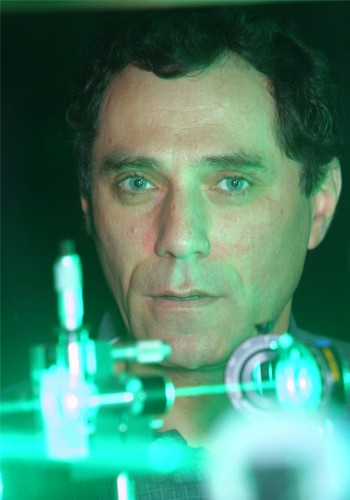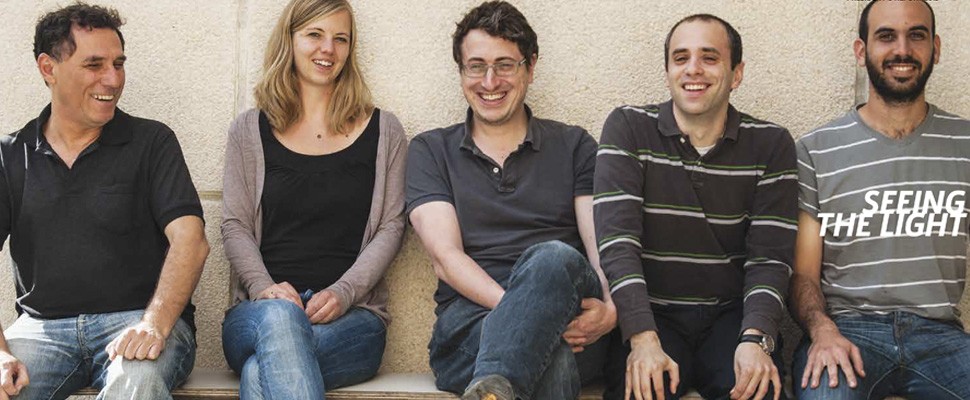Prof. Segev Wins Israel Prize
Minister of Education, Rabbi Shai Piron notified and congratulated Technion Faculty of Physics Distinguished Professor Mordechai (Moti) Segev upon being selected as the 2014 Israel Prize winner for research in chemistry and physics.
The award committee’s reasoning stated that, “Professor Segev is a ground-breaking physicist in the field of optics and lasers. His pioneering contributions are sources of inspiration and his scientific work is referenced in thousands of scientific articles.”
Technion President, Professor Perez Lavie, congratulated Distinguished Professor Segev and thanked him for the great honor he has brought to Technion.
In the Speed of Light
 When the master of ceremony called out his name, Professor Mordechai (Moti) Segev approached the stage wearing jeans and a white shirt. He hopped over the stair easily and to the sounds of laughter from the audience that filled the congress hall in Munich, he received the prestigious European Physics Society (EPS) Quantum Electronics Award in 2007.
When the master of ceremony called out his name, Professor Mordechai (Moti) Segev approached the stage wearing jeans and a white shirt. He hopped over the stair easily and to the sounds of laughter from the audience that filled the congress hall in Munich, he received the prestigious European Physics Society (EPS) Quantum Electronics Award in 2007.
Back in the nineties and early 2000, Professor Moti Segev from the Faculty of Physics studied the behavior of solitons – wave packets that behave and interact with one another like particles do: attracting, repelling, etc. Since then Moti Segev has gone into other areas, ranging from photonic lattices and waves’ propagation in random media to optofluidics – where light controls the mechanical properties of a fluid, and more recently into sub-wavelength imaging. He has made profound discoveries and started several new areas.
Professor Segev and his research group from the Faculty of Physics use non-linear optics to study the basic phenomenon taking place within the realm of non-linear physics. Over the past decade, Professor Moti Segev and his research partners published five articles in the prestigious scientific journal, “Nature” and many articles in Science magazine, Nature Physics, Nature Photonics, nature Materials, and the premiere physics journal Physical Review Letters.
Moti Segev (formerly Sakajo) was born in Romania. When he was three years old his family made an Aliyah to Israel.
They settled in Haifa, in the Stanton neighbourhood in the lower tier of the Carmel city, a poverty-stricken part of town. When he was six, evacuations began, and the family was relocated in ‘improved housing units’ in the Neve Sha’anan neighbourhood (on the outskirts of Technion City).
Young Moti excelled in his studies from day one. During the summer vacation between Grades 1 and 2, he experimented in the field near his house, with limestone wrapped around stone. The result was astounding! Four fire trucks were needed to put out the fire while Moti hid under his parents bed, Shlomo and Zelda.
The family didn`t have money for most things, but for books there always was. Nitsa Movshovitz-Hadar, who later became a professor at the Technion, was Moti`s mathematics teacher. She was the first to recognize his many talents and sent him to extracurricular programs for gifted students at the Technion when he was in 7th Grade.
Despite his outstanding achievements, Moti was suspended from the Municipal Ironi Gimmel High School at 10th grade. The school’s guidance counsellor at the time, Bruria Zafrir, took him under her wing and pledged that from now on he will be manageable. “School bored me,” he admits. “All that interested me was basketball, the youth movement (Hashomer Hatzair) and girls.”
In the army he was in the flight academy course. He lasted in the course about 14 months, until he flew over the border with Jordan in the training jet the “Fouga Magister.” He was suspended from the course and returned to the Nahal core, a unit which later entered Lebanon in Operation Litani. He never returned to his flight course. He was discharged from the Army as a lieutenant, and in the reserves he became the commander of a patrol (“siur”) company. His deputy officer was Yair Mordechai from Kibbutz Shluchot in the Beit Shean Valley. In October 2001, Yair chanced upon a Palestinian on his way home to his Kibbutz. He began to question him, and then the terrorist activated his explosives belt and Yair exploded with him. When Professor Segev tells the story he finds it hard to hide his emotions.
Moti was accepted to the Technion’s Faculty of Electrical Engineering, and completed his undergraduate degree after seven semesters and 250 reserve duty days. For all of the reserve duty he performed during his studies he was eligible for a tuition free ninth semester but he didn’t even need an eighth semester. In addition to the many days he devoted to reserve duty, Moti worked throughout his studies as a youth counselor for children living in fringe neighborhoods such as Tirat HaCarmel, as a teaching assistant in the Faculty of Mathematics, and as an Israeli tour guide. He was very busy and still managed to make the Dean’s list (cum laude). He continued on a direct doctoral study track in electrical engineering, married Tal, and the young couple had three children, Yair, Tamir and Yaron.
Moti did his postdoctoral research period at Caltech and joined Princeton University, where we went through the ranks from assistant professor to full professor in a record time of 4.5 years, and returned to Israel with his family at the end of 1988. “I returned only out of Zionistic ideals and because I wanted to raise my children in Israel,” he explained. “And I don’t have any regrets,” he added.
Are you happy at the Technion?
“I really enjoy conducting my research at the Technion, but along with this I also have a lot of criticisms which I don’t try to hide.”
Are you the naughty but super talented boy at the Faculty?
Professor Segev laughed and corrects: “No, I’m not the naughty boy. Maybe I am the bad boy who cares deeply for the Technion.”
His students say he is overly demanding, with high expectations from them, almost as high as those he demands from himself, but that on the other hand he is very fatherly and caring, not only in professional related matters but also in personal issues. He has often helped his students find job placements or provided assistance with finding solutions to financial problems. Even the spouses of his students are in contact with him. He currently has ten PhD and masters students and two postdocs. He meets with each of them on a daily basis. Each of his students is working on a different project that is very well defined. Above his office door there is a quote: “Forlorn is the Teacher Whose Students Do Not Surpass Him.”
Professor Moti Segev has no reason to be forlorn. Sixteen of his students are professors at MIT, Princeton, the University of Michigan, the University of Florida, the University of San Francisco, the University of Hamburg and the University of Jena in Germany, the National Taiwan University, the University of Zagreb in Croatia, the University of Rome in Italy, four at the Technion, one at Tel Aviv University and one with Bar Ilan University.



